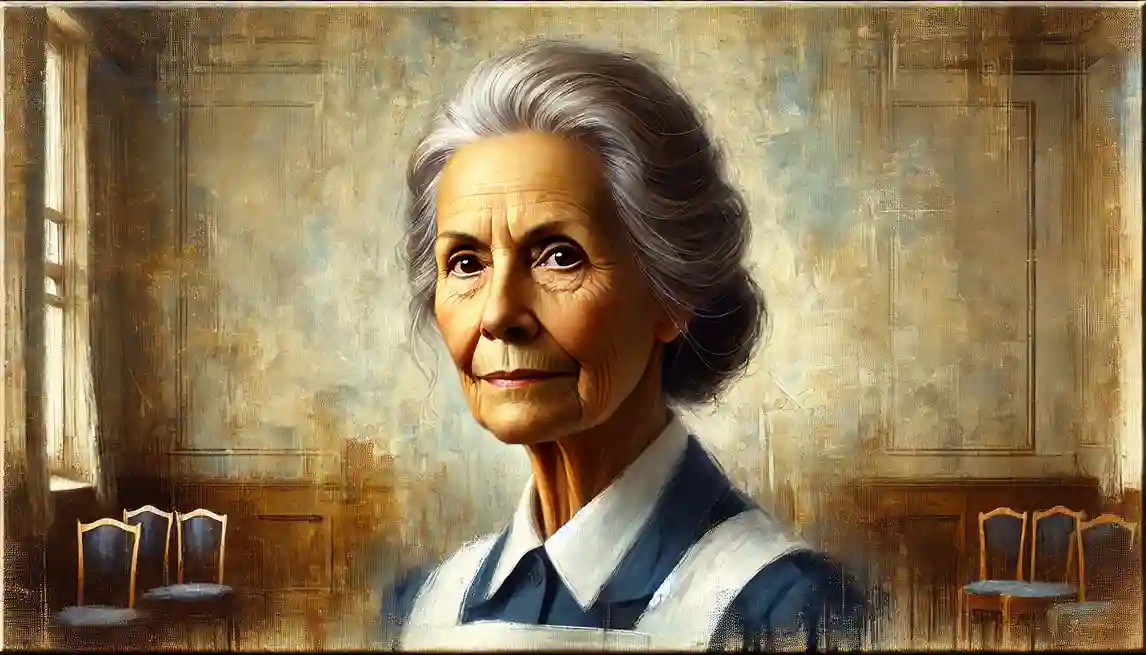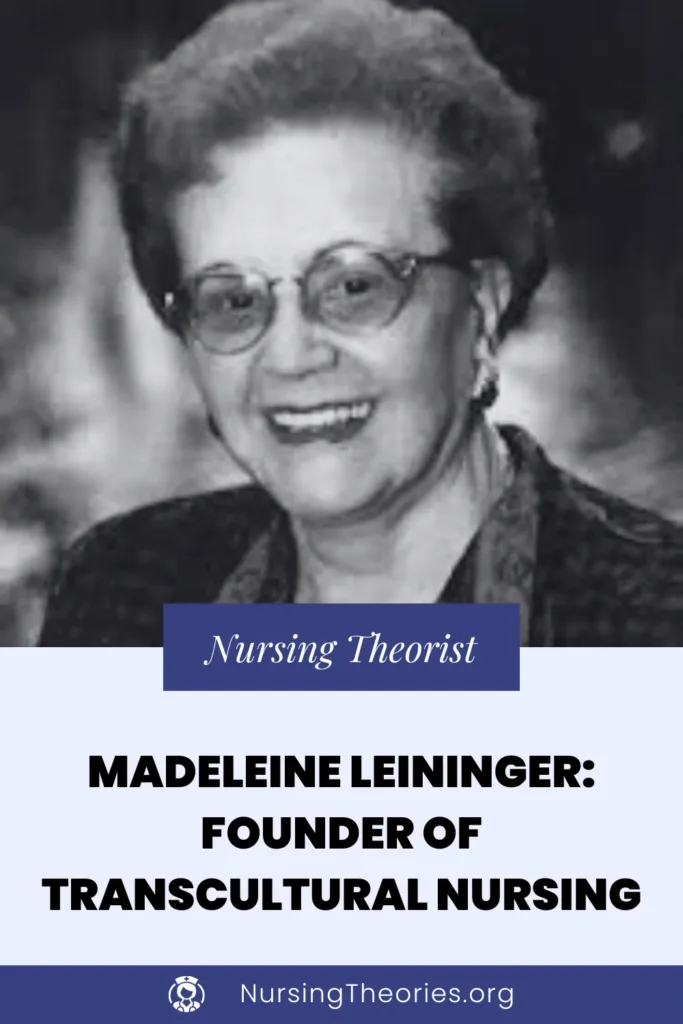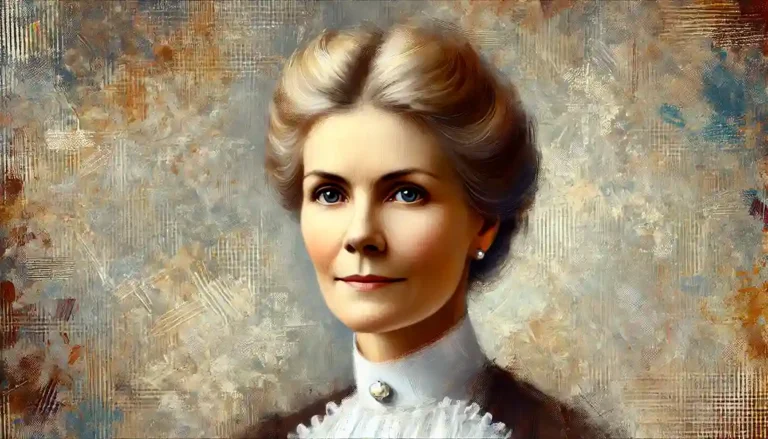Madeleine Leininger, a pioneer in the field of nursing, made history as the founder of Transcultural Nursing, a theory focused on understanding cultural differences in healthcare practices and integrating them into patient care.
Her work revolutionized how nurses approach patient care by emphasizing the importance of cultural competence.
By creating a framework that bridges cultural understanding with clinical practice, Leininger’s contributions have had a lasting impact on the global healthcare system.
In this article, we cover Madeleine Leininger’s life, achievements, philosophy, and lasting impact on modern nursing.

Quick Summary
- Developed the Transcultural Nursing Theory, emphasizing culturally congruent care.
- Introduced the concept of cultural competence in nursing, ensuring respect for patients’ diverse cultural backgrounds.
- Authored several influential works on transcultural nursing, including Culture Care Diversity and Universality: A Worldwide Nursing Theory.
- Established transcultural nursing as an official field of study, enhancing global nursing education and research.
- Recognized worldwide for her pioneering contributions to culturally sensitive healthcare practices.
Early Life and Background of Madeleine Leininger

Birth and Family Background of Madeleine Leininger
- Madeleine Leininger was born on July 13, 1925, in Sutton, Nebraska, Leininger grew up on a farm, where she developed a strong work ethic and compassion for others.
- Her rural upbringing and exposure to diverse groups of people inspired her early interest in understanding different cultures and their healthcare practices.
Education and Early Influences in Leininger’s Life
- Leininger earned her nursing diploma from St. Anthony’s School of Nursing in Denver, Colorado, in 1948.
- She pursued advanced studies, earning a bachelor’s degree, master’s degree, and eventually a Ph.D. in anthropology, which provided her with the tools to develop transcultural nursing.
- Her anthropological studies deeply influenced her understanding of cultural variations in healthcare and laid the foundation for her pioneering work.
Madeleine Leininger’s Philosophy and Vision for Nursing
- Leininger believed that healthcare providers must understand and respect the cultural backgrounds of their patients to deliver effective care.
- Her philosophy emphasized culturally congruent care, which involves tailoring healthcare to fit an individual’s cultural values, beliefs, and practices.
- Famous quote: “Caring is the essence of nursing, and culturally based care is essential for the well-being of patients in a global, multicultural world.”
Madeleine Leininger’s Education and Early Nursing Career
Formal Education and Nursing Training of Madeleine Leininger
- After earning her nursing diploma, Leininger pursued higher education in nursing and anthropology, receiving a master’s degree in nursing from Catholic University of America.
- She later completed her Ph.D. in anthropology at the University of Washington, where she combined her knowledge of human culture with her clinical expertise.
Early Professional Experiences in Leininger’s Career
- Leininger worked as a clinical nurse, nursing educator, and administrator before turning her focus to research.
- Her clinical experience with diverse patient populations revealed significant gaps in culturally sensitive care, motivating her to address these issues through theoretical development.
Key Achievements and Contributions of Madeleine Leininger
Development of the Transcultural Nursing Theory
- The Transcultural Nursing Theory addresses how cultural differences influence healthcare beliefs and practices. It guides nurses in providing care that aligns with patients’ cultural needs.
- The theory focuses on three key modes of nursing intervention:
- Cultural Preservation: Supporting and maintaining culturally meaningful practices.
- Cultural Accommodation: Adjusting healthcare practices to align with cultural preferences.
- Cultural Repatterning: Helping patients modify harmful cultural practices while maintaining respect for their values.
- Leininger’s theory promotes holistic, culturally informed care, emphasizing that understanding patients’ cultural backgrounds leads to better outcomes.
Contributions to Nursing Education and Curriculum Development
- Leininger integrated her theory into nursing curricula, ensuring that future nurses would be trained to deliver culturally competent care.
- She founded the Transcultural Nursing Society in 1974, providing a platform for education, research, and collaboration in the field.
Research and Theoretical Advancements
- Leininger conducted fieldwork in various countries, studying indigenous healthcare practices and integrating these insights into her theory.
- Her extensive research highlighted the importance of culturally appropriate care in promoting patient satisfaction and recovery.
Global Impact and Recognition
- Leininger’s work has influenced nursing standards and healthcare policies globally, promoting cultural competence in healthcare systems.
- She received numerous awards, including honorary doctorates and lifetime achievement recognitions for her contributions to nursing and anthropology.
Overview of Madeleine Leininger’s Transcultural Nursing Theory
- Leininger’s theory is rooted in the idea that nurses must understand and respect the cultural beliefs of their patients to provide optimal care.
- It emphasizes the importance of culturally congruent care to improve patient outcomes and satisfaction.
- To explore this theory in greater depth, visit the in-depth article on Transcultural Nursing.
Notable Publications by Madeleine Leininger
- Culture Care Diversity and Universality: A Worldwide Nursing Theory – One of her most influential works, which outlines the principles of her theory and provides practical applications.
- Transcultural Nursing: Concepts, Theories, Research, and Practice – A comprehensive guide to culturally competent nursing care.
- Numerous articles and research studies on cultural competence and transcultural nursing.
Challenges and Criticisms of Madeleine Leininger’s Work
Challenges in Implementing Transcultural Nursing
- Some healthcare providers and educators have found it challenging to integrate culturally congruent care into busy or resource-limited settings.
- Leininger advocated for institutional support and policy changes to address these challenges.
Criticisms of the Scope of the Theory
- Critics have argued that the theory may be too broad or difficult to apply uniformly in diverse clinical settings.
- However, proponents argue that its flexibility allows it to be adapted to various healthcare contexts.
Timeline of Major Milestones in Madeleine Leininger’s Life
- 1925: Born in Sutton, Nebraska.
- 1948: Earned her nursing diploma from St. Anthony’s School of Nursing.
- 1966: Completed her Ph.D. in anthropology at the University of Washington.
- 1974: Founded the Transcultural Nursing Society.
- 1985: Published Culture Care Diversity and Universality.
- 1998: Received the Lifetime Achievement Award from the Transcultural Nursing Society.
- 2012: Passed away, leaving a lasting legacy in nursing and anthropology.
Legacy and Lasting Impact of Madeleine Leininger
Impact on Nursing Practice and Patient Care
- Leininger’s emphasis on cultural competence has improved patient-provider communication and outcomes in diverse settings.
Global Influence and Recognitions
- Her theory has been adopted by healthcare institutions and nursing schools worldwide.
- Leininger’s contributions have earned her numerous honors, including lifetime achievement awards and honorary doctorates.
Final Years and Passing of Madeleine Leininger
- Leininger continued to mentor students and contribute to transcultural nursing research until her passing in 2012.
- Her legacy lives on through the Transcultural Nursing Society and the widespread application of her theory.
Key Lessons from Madeleine Leininger for Modern Nursing
- Cultural competence: Nurses should understand and respect cultural differences in healthcare beliefs and practices.
- Holistic care: Integrating cultural, physical, and emotional aspects of care improves patient outcomes.
- Cultural sensitivity: Tailoring care to meet the cultural needs of patients fosters trust and collaboration.
- Ongoing education: Continuous learning about cultural diversity is essential for providing effective care.
- Global collaboration: Sharing knowledge across cultures enhances nursing practices worldwide.
Conclusion
Madeleine Leininger’s Transcultural Nursing Theory has redefined how nurses approach patient care by emphasizing the role of cultural understanding and competence.
Her work, explored further in the in-depth article on Transcultural Nursing, continues to guide nurses in delivering culturally sensitive, holistic care that meets the diverse needs of patients across the globe.


